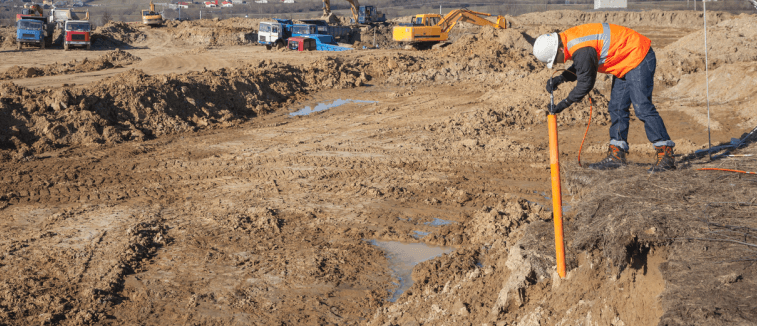Rumored Buzz on Geotheta
Rumored Buzz on Geotheta
Blog Article
Unknown Facts About Geotheta
Table of ContentsThe 4-Minute Rule for GeothetaGeotheta - TruthsGet This Report on GeothetaExcitement About GeothetaGeotheta for Dummies

They carry out website investigations, accumulate samples, carry out research laboratory tests, and assess data to examine the viability of the ground for building and construction projects - Geo Tech Engineering. Based upon their searchings for, geotechnical designers provide recommendations for foundation style, slope security, maintaining structures, and reduction of geotechnical threats. They collaborate with other experts, such as engineers, structural engineers, and building and construction groups, to make certain that geotechnical considerations are integrated right into the total job style and application
By analyzing the habits and residential properties of dirt and rock, they can identify prospective geotechnical dangers such as landslides, soil negotiation, or slope instability. Their knowledge helps protect against failings or accidents that might threaten lives and residential property. Below are some in-depth duties and responsibilities of a geotechnical designer: Website Examination: Geotechnical engineers conduct website investigations to gather data on subsurface problems.
They analyze the information to recognize the properties and habits of the soil and rock, including their stamina, permeability, compaction features, and groundwater conditions. Geotechnical Analysis and Design: Geotechnical designers examine the data collected during website examinations to examine the stability and suitability of the website for building and construction projects. They do geotechnical calculations and modeling to evaluate variables such as bearing capability, negotiation, incline security, side earth stress, and groundwater circulation.
9 Simple Techniques For Geotheta
Structure Design: Geotechnical engineers play a crucial duty in making foundations that can safely support the intended structure. They evaluate the soil problems and load needs to determine the suitable foundation kind, such as shallow foundations (e.g., grounds), deep foundations (e.g (https://geotheta.webflow.io/)., piles), or specialized techniques like dirt enhancement. They think about factors such as negotiation limits, birthing capability, and soil-structure communication to develop optimum structure layouts
They examine building and construction strategies, screen website activities, and perform area assessments to validate that the design referrals are complied with. If unexpected geotechnical concerns emerge, they examine the circumstance and supply suggestions for remediation or changes to the design. Danger Assessment and Mitigation: Geotechnical designers assess geotechnical hazards and risks related to the job website, such as landslides, liquefaction, or soil erosion.

Partnership and Communication: Geotechnical designers function carefully with other experts associated with a job, such as engineers, architectural engineers, and building and construction teams. Effective interaction and partnership are necessary to incorporate geotechnical factors to consider right into the overall project layout and construction procedure. Geotechnical engineers offer technological proficiency, response questions, and guarantee that geotechnical demands are satisfied.
Geotheta Things To Know Before You Get This
Below are some kinds of geotechnical engineers: Foundation Engineer: Structure engineers concentrate on designing and assessing structures for frameworks. They analyze the soil problems, tons requirements, and website qualities to establish the most proper structure type and design, such as shallow structures, deep structures, or specialized strategies like heap structures.
They evaluate the elements affecting incline stability, such as dirt properties, groundwater problems, and incline geometry, and develop methods to avoid incline failures and alleviate dangers. Quake Engineer: Quake designers focus on assessing and designing frameworks to hold up against seismic pressures. They evaluate the seismic hazard of a website, assess soil liquefaction capacity, and establish seismic layout criteria to make certain the safety and security and resilience of frameworks during earthquakes.
They do field testing, accumulate examples, and evaluate the accumulated data to characterize the dirt homes, geologic developments, and groundwater conditions at a website. Geotechnical Instrumentation Designer: Geotechnical instrumentation engineers concentrate on tracking and gauging the actions of soil, rock, and frameworks. They set up and keep instrumentation systems that monitor factors such as dirt settlement, groundwater degrees, slope activities, and structural variations to analyze performance and provide very early warnings of prospective issues.
The Ultimate Guide To Geotheta
They carry out tests such as triaxial examinations, debt consolidation tests, straight shear tests, and leaks in the structure examinations to collect data for geotechnical analysis and layout. Geosynthetics Engineer: Geosynthetics engineers specialize in the style and application of geosynthetic materials, such as geotextiles, geogrids, and geomembranes. They make use of these materials to boost soil security, enhance slopes, give drainage services, and control erosion.
They have a tendency to be investigative individuals, which suggests they're intellectual, reflective, and curious. They are curious, methodical, rational, analytical, and logical. A few of them are also social, implying they're kind, charitable, participating, patient, caring, practical, empathetic, sensible, and friendly. Does this seem like you? Take our free occupation test to learn if geotechnical designer is one of your leading occupation matches.
In the workplace environment, geotechnical engineers utilize specialized software tools to perform calculations, create layouts, and assess information. They prepare reports, evaluation project specifications, connect with customers and staff member, and coordinate project activities. The office setup offers a conducive setting for research, analysis, and cooperation with other specialists associated with the task.
The Greatest Guide To Geotheta
They often check out task websites to carry out site investigations, analyze geotechnical problems, and collect information for analysis. These check outs entail traveling to various locations, sometimes in remote or challenging surfaces. Geotechnical engineers may carry out soil sampling, conduct tests, and display building tasks to make certain that the geotechnical elements of the task are being implemented properly.
Geotechnical engineers additionally function in specialized geotechnical laboratories. In these centers, they conduct experiments, perform tests on dirt and rock samples, and assess the engineering homes of the products. Geotechnical lab designers function extensively in these atmospheres, managing testing devices, operating instruments, and recording my latest blog post data. They team up with various other laboratory team to make sure precise and dependable testing outcomes.
Report this page